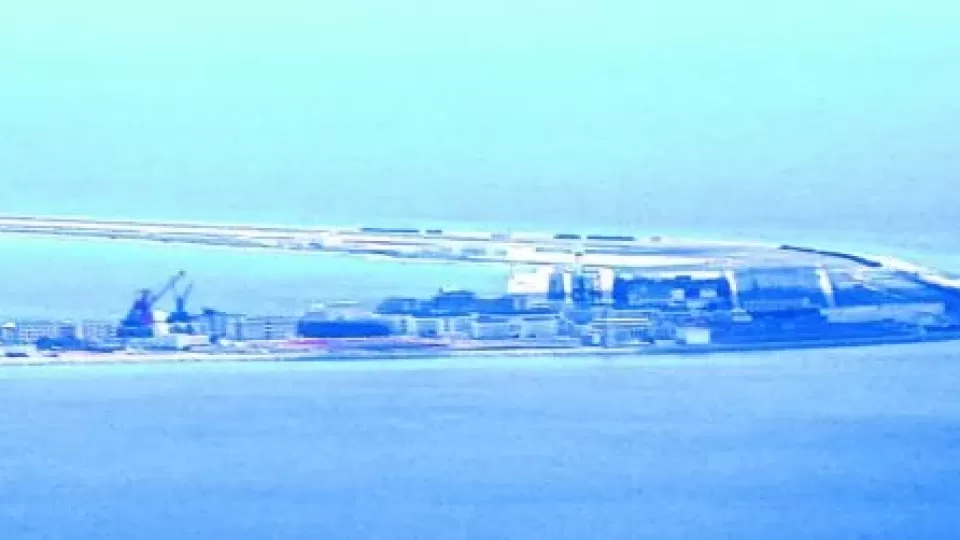November 22, 2022
MANILA — A tense confrontation in the West Philippine Sea occurred on Sunday morning between a boat sent by the Philippine Navy and a vessel of the Chinese coast guard.
The face-off happened several hours before US Vice President Kamala Harris’ arrival in Manila for a three-day visit.
The military said on Monday that the Philippine Navy was towing a suspected rocket debris to Philippine-held Pag-asa (Thitu) Island, some 480 kilometers northwest of Palawan province, when a China Coast Guard ship appeared and blocked the boat, then “forcefully retrieved” the debris.
The Chinese vessel then sent an inflatable boat with some of its personnel on board to the floating object and cut the towing line attached to the Philippine Navy boat, Vice Adm. Alberto Carlos, chief of the military’s Western Command (Wescom), said in a statement.
This was followed a few hours later by a series of blasts heard by the island’s residents.
“The blasts were not here, but we felt the jolt,” a Pag-asa resident told the Inquirer.
The Navy men deployed from Naval Station Emilio Liwanag in Pag-asa were unable to recover the debris and ultimately headed back to the island.
Photos seen by the Inquirer showed the naval boat dwarfed by the 102-meter Chinese vessel during the hourlong incident.
Wescom spokesperson Maj. Cherryl Tindog said the debris appeared similar to the Chinese rocket wreckage recently recovered in Busuanga, also in Palawan, early this month.
China issued a global advisory at that time saying that “expected unburned debris” was due to drop to Earth from its Tiangong Space Station.
Tindog said the Navy did not resist the seizure. “We practiced maximum tolerance… Since it was an unidentified object and not a matter of life and death, our team just decided to return.”
‘Friendly consultation’
The Chinese Embassy, however, issued a statement on Monday night disputing “[r]elevant reports [which] are inconsistent with facts.”
Citing the Chinese Foreign Ministry, the embassy said it was the China Coast Guard ship that found “the wreckage of… a [space] rocket recently launched by China.”
“Before the China Coast Guard found the said floating object some Philippine Navy personnel already retrieved and towed it. After friendly consultation, the Philippine side returned the floating object to the Chinese side on the spot,” the embassy said further.
It added: “The Chinese side expressed gratitude to the Philippine side. There was no so-called blocking of the course of a Philippine Navy boat and forcefully retrieving the object at the scene.”
Maritime expert Jay Batongbacal said earlier in a post on Facebook: “If China wanted its space junk back, it should have asked for its return and given the salvors compensation for the trouble they went through to pick it up. This is also provided for by international law on salvage, which is drawn from both customary international law and the salvage convention.”
He also said the reported blasts were “indeed a matter of concern.”
A report from Pag-asa’s police said “the repetitive sounds [were] believed [to have come] from artillery guns/weapons” from Chinese-held Zamora (Subi) Reef about 26 km away—one of seven man-made islands built by Beijing in the Spratlys.
“If [China] really wants to resolve the disputes amicably, then it should generate trust and confidence about its activities. But this cannot happen without transparency and forthrightness,” Batongbacal said.
Harris, who met with President Ferdinand Marcos Jr. on Monday, took the occasion to reaffirm her country’s commitment to the 1951 Mutual Defense Treaty with the Philippines, among other areas of Washington’s relations with Manila.
She is due to travel today to an island off mainland Palawan. Among her scheduled activities are a tour on board the Philippine Coast Guard’s BRP Teresa Magbanua, a briefing on maritime security and a meeting with fishermen and villagers.


